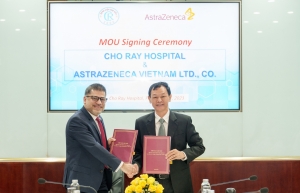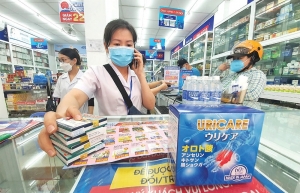Multinational pharma groups keen on robust partnerships
 |
| Vietnam has already extended marketing authorisation, but also wants to revise the pharma law Photo: Shutterstock |
AstraZeneca Vietnam and Cho Ray Hospital in February signed a MoU to extend their commitment to improving healthcare innovation in southern Vietnam until 2025. The new MoU is part of the British-Swedish company’s strategy to strengthen partnerships in Vietnam
Nitin Kapoor, chairman and general director of AstraZeneca Vietnam and Asia Area Frontier Markets told VIR, “In Vietnam, AstraZeneca will continue to focus on the supply and local contract manufacturing of medicines and leverage digital innovations to deliver new solutions to patients. We will also advance our existing and new partnerships to help Vietnam develop sustainably, protect the environment, and achieve better patient outcomes.”
Kapoor added that 2022 was a remarkable year for AstraZeneca. The company has brought several new medicines to Vietnam to help alleviate the dual burden of non-communicable diseases and COVID-19, in addition to launching various new drug indications in oncology and respiratory diseases to expand access for patients.
The visit of CEO Pascal Soriot to Vietnam also brought the partnership between the company and the government to new heights.
Following the visit, the company announced several new programmes such as phase II of the Partnership for Health System Sustainability and Resiliency to strengthen the Vietnamese health system’s sustainability and resilience; the Healthy Lung programme’s latest phase to enhance asthma treatment amongst children; and the CAREME initiative to transform the prevention and treatment of cardiovascular, renal, and metabolic diseases.
The strong performance in Vietnam partly contributed to the global group’s business result in 2022 when it reported a total revenue increase of 25 per cent to $44.35 billion, with growth coming from all therapy areas, and from the addition of Alexion, which was incorporated into the group’s results from July 2021.
AstraZeneca expects to see another year of double-digit revenue growth, excluding its COVID-19 medicines, and it will continue to invest behind its pipeline and recent product launches.
“We are firing on all cylinders, just as patients and society need us to, and by staying true to our purpose and continuing to live our values, 2023 will be another important year on our journey as we continue to build our pipeline and deliver for patients,” Kapoor noted.
Bringing innovations
Similarly, 2022 marked several milestones for Novartis in its efforts to strengthen the healthcare system and make innovative medicines available and accessible to more patients in Vietnam. In particular, in April and August respectively, it announced partnerships with Pharmacity and FPT Long Chau to help expand access of patients to Novartis medicines at nearly 2,000 pharmacy stores nationwide.
In September, Novartis also signed an MoU with K Hospital for improvement of cancer care for patients in Vietnam and launched an initiative on strengthening breast cancer care for patients in the northern province of Bac Ninh. In December, the company and the National Fund for Vietnamese Children entered a 3-year sponsorship agreement to help spread awareness of people who suffer from the rare genetic disease, spinal muscular atrophy.
Last year, Novartis recorded net sales of $50.5 billion, driven by volume growth of 11 percentage points, partly offset by price erosion of 4 percentage points and the negative impact from generic competition of 3 percentage points. Its core operating income was $16.7 billion, benefiting from higher sales and partly offset by higher research and development investments. Core operating income margin was 33 per cent of net sales, increasing by 0.9 percentage points.
In 2023, Novartis plans to focus on bringing its most innovative medicines to patients in Vietnam and working with hospitals and physicians to ensure that the latest standards of treatment are applied.
Karina Ng, country president at Novartis Vietnam, said, “Our priority therapeutic areas are cardiovascular, immunology, and oncology where we have an ambition to transform the treatment landscape with our breakthrough medicines. We also plan to bring gene and cell therapy to Vietnam to treat children with spinal muscular atrophy.”
Novartis will prioritise building on and expanding partnerships with the Vietnamese government, healthcare organisations, and academies as well as industry associations with joint efforts to co-create solutions in strengthening the healthcare system sustainably in the long term, Karina Ng added.
Elsewhere, Pfizer has strengthened cooperation with the MoH to support deliver COVID-19 vaccines and to support Vietnam’s healthcare system.
“Besides our significant contribution in supplying vaccines to Vietnam, more than eight million Vietnam patients were treated with our medicines and vaccines in 2022 across other therapeutic areas including oncology, rare diseased, internal medicine, anti-infectives, and immunology,” said Darrell Oh, general director at Pfizer Vietnam.
Globally, Pfizer sold $37.8 billion of its COVID-19 vaccine last year, a small increase of 3 per cent compared with 2021 as demand for the shots slowed. The pandemic propelled Pfizer’s earnings to a record $100 billion last year, over half of which was driven by its vaccine and antiviral pill Paxlovid. Pfizer expects its revenue to decline in 2023 by as much as one-third to a range of $67-71 billion.
“We are exploring new vaccine candidates to provide broad protection against current, emerging, and future variants of concern, while also advancing studies exploring our oral treatment in additional populations with high unmet need and continuing work on potential next-generation oral treatments,” the representative of Pfizer Vietnam added.
Legal complexities
Despite the improvements, multinational corporations like Pfizer, Novartis, and Sanofi are facing challenges in Vietnam. They include the supportive legal framework to facilitate the supply of the medicines, tenders, reimbursement policy, and operations of foreign-invested importers.
According to Karina Ng of Novarti, the complexity and risk of legal framework which create the barriers for access and operation, may lead to many consequences. “It drives up the cost of doing business for companies and it puts patients at risk of not having medicine available. Further, the complexity is consuming resources at all levels of the industry from health authorities to hospitals,” Karina Ng said.
To address these barriers, leaders in Vietnam offered solutions to mitigate the shortage of medicine supply during 2022 in the form of extensions of marketing authorisation (MA), renewal simplification, and directions to revise the Law on Pharmaceuticals.
Karina Ng, however, added that solving the shortage of medicine supply requires a holistic and consistent legal reform in the long run. “There are still countless remained legal issues waiting for governmental action such as the pharma law revision, decree revisions, revision of health insurance, and more,” she said.
Multinationals expect the time of approval of medicines to be reduced, especially compared with other countries in ASEAN such as Singapore and Malaysia, which can be achieved through MA renewal simplification and drug registration harmonisation with worldwide practices to reduce the administrative burden.
“We also expect new regulations will remove the requirement for quota licences for products that have been registered in Vietnam so that we can supply drugs whenever the patient needs it, and give the freedom for companies to share product information and updated scientific information to healthcare professionals,” the Novartis Vietnam leader recommended.
Meanwhile, the representative of Pfizer Vietnam suggested that in the long term, regulations related to the approval of registration dossiers need to be considered and adjusted comprehensively through the amendment of the Law on Pharmaceuticals, which is expected to be reviewed in 2024 by the National Assembly.
“The process of price negotiations and drug tenders, if carried out faster, will contribute significantly to solving the problem of drug shortages,” he said. “We hope that Vietnam will have a solid national strategy to develop a world-class innovative pharma industry so that it not only produces but also exports high-quality drugs to other countries in the region.”
“It can also accelerate the approval of innovative medicines to provide Vietnamese patients, and those coming from abroad, with the most cutting-edge treatment options.”
 | Pharma giant extends partnership with Cho Ray Hospital AstraZeneca Vietnam and Cho Ray Hospital signed an MoU in February to extend their commitment to improving healthcare innovation in southern Vietnam until 2025. |
 | Extension eases strain on drugs management International pharma businesses are pinning high hopes on smooth business performance after their long-expected proposal of extension of marketing authorisation for drugs was approved. |
 | Top pharma names advocate for sweeping legal revamps With the Ministry of Health’s latest pledge to improve upon medical legislation, international businesses continue to pin high hopes on marketing authorisation regulations for medical devices and distribution rights in order to drive their plans forward. |
What the stars mean:
★ Poor ★ ★ Promising ★★★ Good ★★★★ Very good ★★★★★ Exceptional
Related Contents
Latest News
More News
- Vietnam shifts into new real estate cycle (February 26, 2026 | 08:00)
- Citi report finds global trade transformed by tariffs and AI (February 25, 2026 | 10:49)
- SK Innovation-led consortium wins $2.3 billion LNG project in Nghe An (February 25, 2026 | 07:56)
- South Korean VC completes buyout of Chicken Plus Vietnam (February 25, 2026 | 07:55)
- THACO opens $70 million manufacturing complex in Danang (February 25, 2026 | 07:54)
- Vietnam’s new construction regulations shift accountability in real estate (February 25, 2026 | 07:51)
- Masan Consumer names new deputy CEO to drive foods and beverages growth (February 23, 2026 | 20:52)
- E-vehicle infrastructure financing for high growth (February 20, 2026 | 15:09)
- Myriad risks ahead, but ones Vietnam can confront (February 20, 2026 | 15:02)
- Economic factors and themes to be mindful of (February 20, 2026 | 14:55)

 Tag:
Tag:
















 Mobile Version
Mobile Version